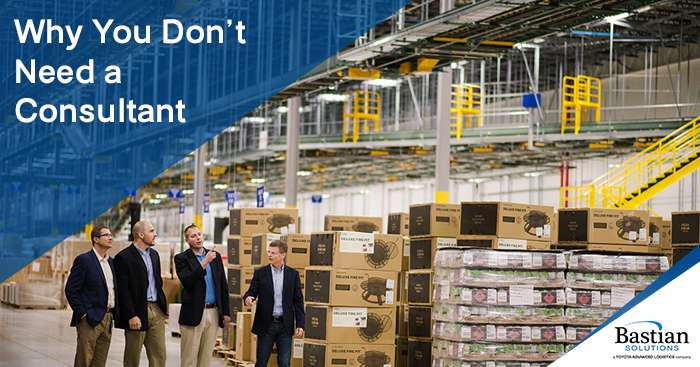
Why You Don't Need a Consultant
Dean Starovasnik | 28 June 2019
I am frequently asked “Is my order or SKU volume sufficient to warrant automating my operations?” Of course, no consultant worth his frequent flyer miles is going to answer that question simply. They’d say something like “The considerations for automation include a wide range of factors, such as the following:
- Complexity of the operation (more complex => more labor)
- Full pallet versus case versus each picking
- Types and quantity of additional services (gift wrap, customization, configuration, etc.) provided
- Sales channels (direct to consumer, retail, wholesale, international)
- Cycle time (higher SLA => more automation can help with cycle time)
- Order to ship service level
- Expedite frequency
- Customer service promises
- Comparative costs (think Europe vs. the US)
- Local labor rates
- Real estate costs (urban, suburban, rural)
- Compliance (legal, regulatory, risk)
- Volumes (after all the above, they do matter, of course)
- SKU count
- Order volume
- Lines or units/order
- Number of operators handling product
- Growth rates increasing any or all the above
- And so on…”
Obviously, it’s not a simple matter of just a particular volume threshold or SKU count. That’s why firms hire consultants to help them determine… hold on just a minute! Wasn’t this “Why you DON’T need a consultant?”
Well, then when don’t you need a consultant? Because consultants can help just about any operation where its leadership is wondering whether or not they need a consultant. If they were so squared away that a consultant couldn’t be much use, they wouldn’t be asking whether they needed one! And no, that’s not tautological. Just think about it a second.
Justifying the Cost of a Consultant
When should you skip a consultant? First, start with how much return you need to justify investing in a consultant? Most material handling consultants can’t start their engine for less than $25K. That’s about half of an FTE’s (full time equivalent) pay for a year. If you only have 6 people in the outbound operation (where most of the labor in a DC is located), can you envision making one of them half time, reducing your labor by ~15%? That’s what it would take to pay back that consulting investment in the first year. On the other hand, it’s just a 2% reduction in a team of 25 FTEs. That should be an easy target to achieve. So, if you have less than a dozen people involved in your outbound operation, a consultant is likely not going to be able to justify their fees in the improvements they identify.
Further, if they recommend some automated technology like goods-to-person (GTP), sortation, automated packing or labeling, etc., you can’t even enter that toy store without half a million in spending money. Why half a million? That’s about what it takes for entry level automation when you include WMS modifications, a limited WCS, conveyor, installation, permits and, of course, the particular technology you’re looking to buy. So, if you’re going to justify $500K, assuming FTEs run about $50K burdened per year and a three-year payback is desired, you’ll need to reduce outbound labor by at least 3-4 people. In a 20-person outbound team, that’s 15-20%, a common range for head count reductions. If you have less than 20 people in outbound, you’ll need to adjust accordingly (longer payback period or greater reductions).
If you’re well below 20 in outbound, automation is likely not in your future. That is, unless you can find some “chunks” of money to save one time with the implementation. What are these “chunks?” Primarily, these fall into the “cost avoidance” category; relocating to a new facility, expansion, or some other large capital expense. For instance, if your pick area is 30K square feet (SF) and a GTP tool can get that into 10K, you may avoid building an expansion of 20K SF. At $75/SF or about $1.5M, that can reduce the incremental capital automation would cost to a much smaller number – thereby shortening the payback period considerably.
When Is a Consultant Justified?
So, perhaps in summary, we’ll look at the title question in the reverse? When do you need a consultant? First, if you’ve got a dozen or so folks in outbound, a consultant should be able to, at a minimum, justify their fees with some form of labor or other savings. Second, when you have a couple dozen people or more in outbound, a consulting engagement leading to some level of automation is warranted. Finally, when the opportunity to avoid moving your operation or expanding your building exists, automation may very well make sense, necessitating expert assistance to determine if it does.
Are you still wondering whether you need a consultant? Contact us. We’re happy to give you more insight into the process so you can confidently make that decision.
Dean is the Director of Consulting Sales at Bastian. As such, he initiates new distribution center design projects with our consulting teams and assists with their completion. Dean has over 25 experience in distribution consulting after serving for 10 years as a surface warfare officer in the US Navy. He received a bachelor of science degree in Aerospace Engineering from MIT and a master of science from the Naval Postgraduate School in Space Systems as well as a micro-masters from MIT in Supply Chain.
Comments
Roger Wilke says:
6/28/2019 11:31 AM
Dean - great job on this blog. Concise and informative!!
Best Regards,
Roger Wilke
Leave a Reply
Your email address will not be published.
Comment
Thank you for your comment.